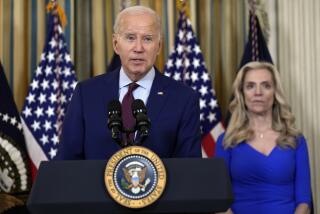Panels Ask Reagan to Ease Some Antitrust Guidelines
- Share via
WASHINGTON — Two Cabinet-level groups have unanimously recommended to President Reagan that anti-merger guidelines should be relaxed for declining industries that have been weakened by foreign competition, Commerce Secretary Malcolm Baldrige said Thursday.
The proposal is designed to help hard-pressed U.S. industries such as steel and textiles face down foreign competitors, which for the most part face few constraints on merging, collusive pricing and similar tactics.
In a joint meeting on Tuesday, the Domestic Policy Council, headed by Atty. Gen. Edwin Meese III, and the Economic Policy Council, chaired by Treasury Secretary James A. Baker III, also approved modifying the 71-year-old Clayton Antitrust Act to allow mergers that would clearly have no anti-competitive impact.
The two proposals, if approved by Reagan and enacted by Congress, would be part of the most comprehensive updating of the nation’s antitrust laws since 1914.
Baldrige, in a breakfast meeting with reporters, conceded that Congress has balked at overhauling the nation’s antitrust laws despite increasing competition from foreign companies that are not restrained by similar laws at home. Baldrige outlined the key proposals that the two Cabinet-level councils sent to Reagan:
- Trade law. When the International Trade Commission determines that an industry has been injured by international trade, regardless of whether there have been unfair trading practices, the President would have the option of relaxing antitrust standards for the industry for a five-year grace period. At present, the President has only two choices--to refuse any help or to authorize openly protectionist remedies such as import quotas or higher tariffs. Congress is considering legislation that would require quota or tariff protection for any industry judged by the ITC to have been injured by foreign trade.
- Merger policy. Congress would enshrine in law the Justice Department’s current policy of approving “helpful” or “neutral” mergers. W. Stephen Cannon, deputy assistant attorney general in the antitrust division, said these are mergers that have one of two effects--either they enhance competition through such strategies as shared research and development or they increase an industry’s efficiency and allow price reductions. The 1914 Clayton Act now prohibits mergers that “may” reduce competition or “tend to create a monopoly.”
- Antitrust penalties. The two councils recommended that treble damage assessments be eliminated in cases in which one competitor charges another in court with anti-competitive behavior. Douglas H. Ginsburg, the assistant attorney general for antitrust, said such behavior frequently reflects nothing more than greater efficiency and lower prices. Moreover, they recommended, the complaining party should have to pay court costs if a failing suit were judged to have been brought in bad faith.
Cannon said treble damages would still be levied in cases of price collusion and bid rigging or in the event that competition is impeded. Successful single-damage antitrust complainants would be entitled to receive interest on their damages retroactive to the date that they filed their suits. Finally, the federal government would be able to claim treble damages if it could demonstrate antitrust violations by contractors.
On the matter of trade law reforms, Baldrige said it was “good common sense” to give the President a third option besides no help at all and outright protectionism for industries injured by imports.
Relaxing antitrust laws, he said, would give companies in those industries a chance to restructure, streamline, cut costs and increase productivity to compete effectively with foreign companies. And it would let the President avoid tariffs or quotas, which Baldrige said raise domestic prices, invite retaliation by U.S. trading partners and often weaken the protected industry in the long run.
To make sure the relaxed antitrust standard would not be abused, Cannon said, it is proposed that an industry winning such relief could not return to the ITC in search of quotas or tariffs during the five-year grace period.
More to Read
Get the L.A. Times Politics newsletter
Deeply reported insights into legislation, politics and policy from Sacramento, Washington and beyond. In your inbox twice per week.
You may occasionally receive promotional content from the Los Angeles Times.










